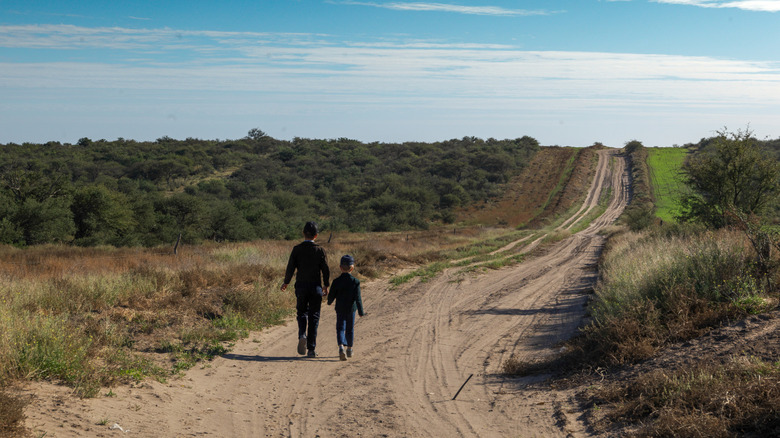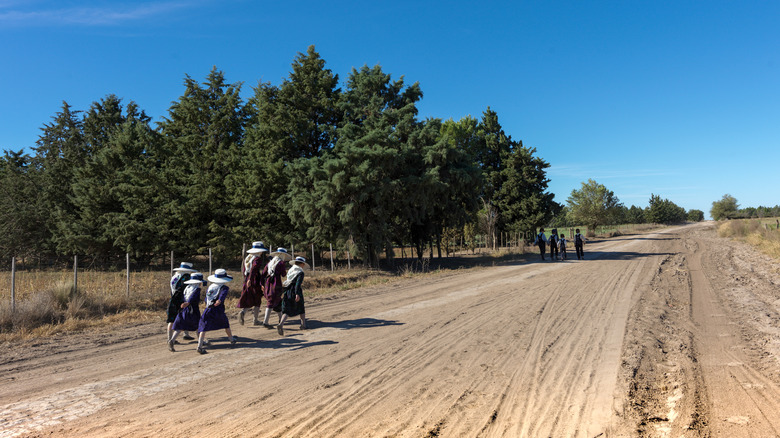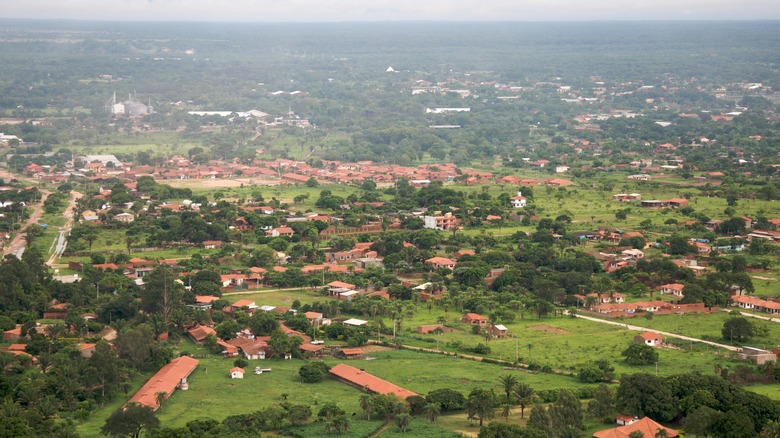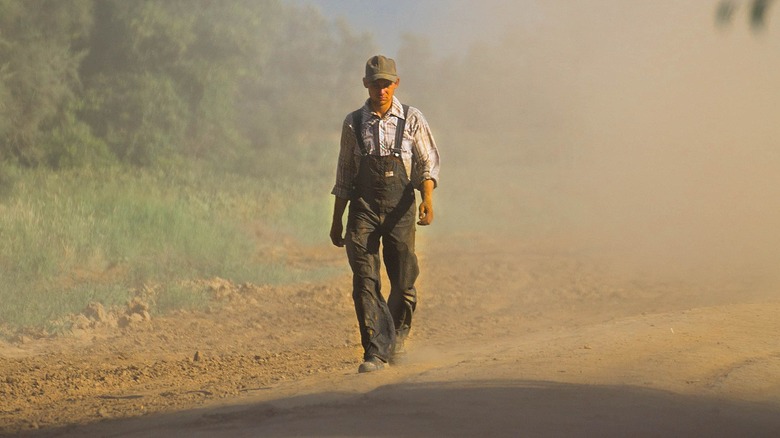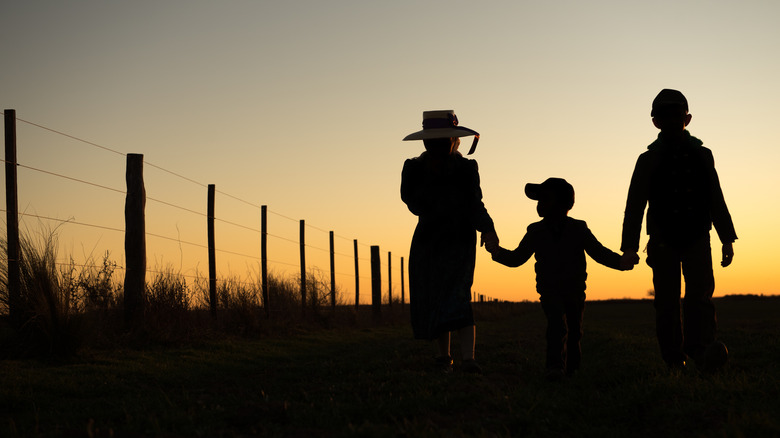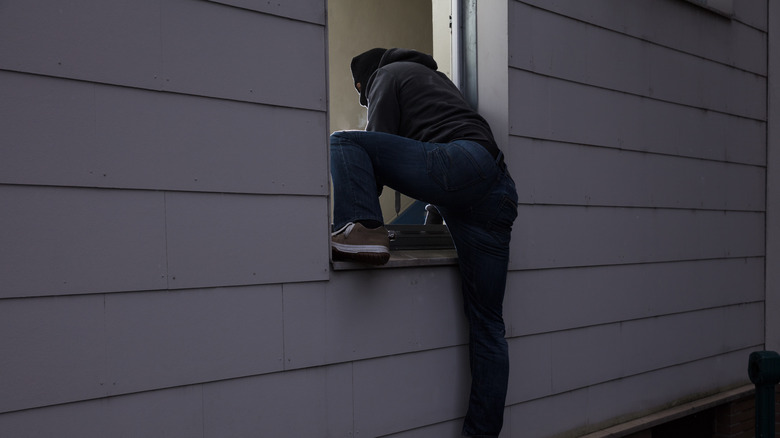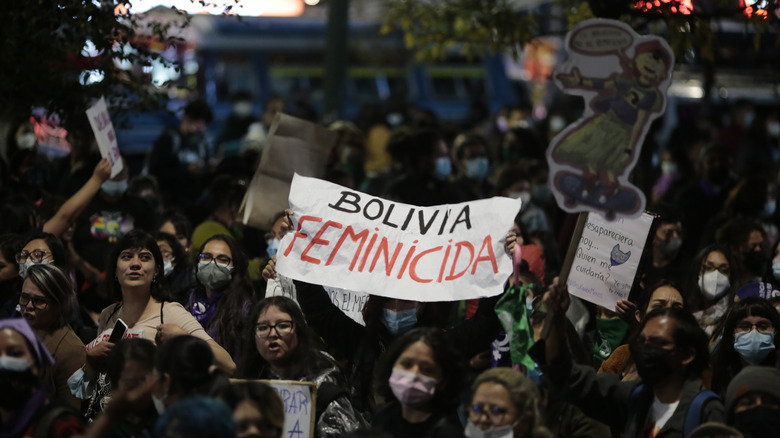Disturbing Details About The Bolivian Mennonite Sex Abuse Scandal
Hidden away in rural Bolivia, an ultra-conservative Mennonite religious community was subject to one of the strangest rape cases of all time — with some even stranger outcomes. Over 100 women in the small colony were assaulted while unconscious from 2005 to 2009, all while their families lay asleep next to them (via Vice).
Today the attacks are known as the Bolivian "ghost rapes" because, when the culprits were not immediately identified, many people within the community resorted to supernatural explanations to understand what was happening. Shielded by a combination of superstition and shame, the perpetrators got away with attacking women en masse for four whole years.
The unusual upbringing and beliefs of the community have meant that even today, many women are hesitant to come forward about the attacks. Many Mennonite men are still more sympathetic to the perpetrators of the abuse than the women who are stigmatized for their trauma. Although a group of men was eventually locked up for the attacks, sexual abuse is still rampant within the community. These are the disturbing details about the Bolivian Mennonite sex abuse scandal.
Content warning: The following article includes allegations and descriptions of sexual assault, child abuse, and domestic violence.
If you or anyone you know has been a victim of sexual assault, help is available. Visit the Rape, Abuse & Incest National Network website or contact RAINN's National Helpline at 1-800-656-HOPE (4673).
If you or someone you know may be the victim of child abuse, please contact the Childhelp National Child Abuse Hotline at 1-800-4-A-Child (1-800-422-4453) or contact their live chat services.
The strange lives of the Bolivian Mennonites
The Bolivian ghost rape scandal took place in the small religious community of Manitoba, home to just 2,000 residents and situated in the middle of nowhere (via The Guardian). For those unfamiliar with the obscure Christian sect, the Mennonites are related to the Amish and live a similar lifestyle. According to National Geographic, for the most part, the Mennonites do not use modern technology, although they make acceptions for some devices, such as old tractors. Mennonite men and women strive to live like simple farmers, and they adhere to a very strict Christian code of conduct.
Today there are many Mennonite communities in rural Bolivia: around 60,000 spread across various colonies. While some aspects of their lifestyle seem quite charming, conservative Mennonite communities have also come under fire for their sexist ideas about women. Many Bolivian Mennonites moved to the small Latin American country because of American and Canadian rules around schooling that interfered with their lifestyle choices. For example, a Vice magazine reporter who visited Manitoba was told that the Mennonites do not believe that girls should study mathematics — but they do require them to observe strict gender roles.
Like many other conservative religious groups, Mennonite communes are also oddly secretive. The Manitoba colony is completely disconnected from society at large — sporting dirt roads and devoid of electricity. Outsiders who have studied the community are few and far between, and photographers have reported that it is notoriously difficult to get community members to agree to pose for pictures.
At least 130 women were raped while unconscious
From 2005 to 2009, a chilling series of events swept the tiny Mennonite colony of Manitoba. Countless women across the community awoke to find themselves in a state of undress, their bodies and bedclothes stained with semen (via the BBC). Although the physical evidence of rape was obvious, none of them could remember being assaulted.
Women and girls were disturbed by missing underwear, sore bodies, and curious headaches they could not explain. Under the influence of powerful sedatives administered by their attackers, the women who were assaulted sometimes had hazy, ghostly-seeming recollections of their assaults. Speaking with The Guardian, one woman recounted that on one occasion she could remember feeling the weight of another person's body on top of her, but was unable to fully regain consciousness. Another woman, interviewed by Time magazine, reported seeing a man on top of her but being unable to move her arms or stop the attack.
Nobody was safe from these terrible nighttime visitations; children were attacked, as were the elderly. One of the women who was attacked was pregnant at the time, while another had a serious mental disability. One of the youngest victims was just three years old. Eventually, knowledge of the attacks spread through the town, however, nothing would be done about it for years to come.
Some victims were tied down or injured
One of the victims, a local mother named Sara Guenter, was among the first to report the attacks. Speaking with Vice magazine, Guenter explained that her attackers tied her to her own bed on several occasions, hurting her wrists and ankles. Faced with some pretty hard evidence that something terrible was going on, Guenter told her sisters about the attacks, but they assumed she was making it up. Sadly, around the same time, Guenter's two teenage daughters were assaulted as well.
Aside from the psychological damage, many of the women also suffered serious injuries or medical complications as a result of the attacks. Mennonite Helena Martens, for example, frequently awoke in great pain from the violence of the attacks and was eventually forced to have surgery on her uterus. According to Time, another victim went into premature labor after she had been assaulted.
In addition to the physical injuries caused by the assaults, many of the women were badly affected by the constant druggings. Scores of victims suffered pounding headaches and terrible lethargy, adverse reactions to the heavy sedatives administered to them.
The silence of shame
Tragically, in a community where sexual purity is currency, many of the victims refused to come forward. Although the official number of victims established at the trial was 130, Vice reports that the real number may have been much higher — some say 200 or more.
According to the BBC, following the attacks, many Mennonite families were preoccupied with the fear that their daughters would be shunned for not being virgins; women in Mennonite communities are not allowed to have sex before marriage. The taboos around sex are so strong that some of the women that were attacked no longer go to church, fearing that they are now "impure" (via Time).
Sex is such a taboo subject in the Manitoba colony, young girls have very little sex education and are not even taught the names of their own genitals. The silence around sex meant that prosecutors had great difficulty getting the victims to describe their sexual assaults in court, a punishing ordeal that women find challenging in even the most liberal of societies. It is not just women who are struggling with the accompanying shame either: It is believed that many men and boys were also victims of the sex attacks. However, although reports of assaults on males were whispered among the community, none of the men have gone on record.
Some people believed it was the work of demons or ghosts
Unfortunately, many people in the community dismissed the women for indulging in flights of fancy (via Vice). However, as the attacks spread, it became common knowledge that something seriously disturbing was happening within the colony.
When faced with the harrowing truth, the highly religious group turned to supernatural explanations for the attacks. Many believed the town was haunted by demons who had been attacking the women in the night, and hazy recollections caused by the drugs added to the belief. Fredy Perez, the prosecutor who worked on the Mennonite rape case, remarked that fear of the supernatural also kept the women quiet. Speaking with BBC, he stated that, " ... they didn't discuss it with neighbors in case someone said, 'That house has the devil in it.'"
The strange case of the so-called "Bolivian Ghost rapes" was later retold in the critically acclaimed novel "Women Talking" by author Miriam Toews. In an interview with the National Post, Toews (once a Mennonite herself) remarked that it was unsurprising that the women were taken in by the ghostly explanations proffered by a community she called "fundamentalist." Toews commented that: "... the fact that these attacks are still being referred to as 'The Ghost Rapes of Bolivia,' it's a horrible way of referring to these attacks. It reinforces the lies that were told to deal with these attacks .... it serves the plans of the elders of the community, the bishop, the patriarchy basically, that is really invested in keeping this swept under the rug."
Due to a lack of police, the case was not investigated
Before the community had any real suspects, the rapes were not investigated by the town's officials, and so the attacks inevitably continued for at least four years (via Vice). The Manitoba colony is a world apart from the rest of Bolivia, and police rarely interfere in their affairs unless they are summoned. Most of the community were also raised to speak low German, and know no Spanish, making contact with the outside world that much more daunting.
The council elders (a small group of officials, including a bishop) are the ones in charge of dispensing justice — no other authority has a right to intervene in their community. Sadly, the elders did nothing, and the women had to find ways to protect themselves during that time. One of the victims, Sara Guenter, described trying to stay awake all night out of fear of further attacks and calling in a friend to stand guard outside her house.
The Guardian reports that after the case became public, both men and women began to feel deeply unsafe living in a town with no police. Today many people in Manitoba have installed bars on their windows and locks on their doors for the first time, while other residents now sleep in basements to feel more secure.
The rapists were finally caught during a failed break-in
In 2009, the gang responsible for the attacks was finally caught after one break-in went badly wrong. According to Vice, two of the attackers were caught in the act, and they gave up the names of the rest of the culprits — nine in total. The men were confined in basements and sheds, and the police were eventually called to prevent the furious men in the town from lynching the attackers.
When they were initially caught, the group admitted to drugging the women and committing the rapes. According to The Guardian, one man, Peter Kennell, admitted, "I raped about 23 women ... I cannot say why, but after the first time it became a habit and I used to do it twice a week." The seriousness of the charges did not seem to affect the defendants, who were disciplined on more than one occasion at the trial for not taking it seriously.
By the time they were up for prosecution, the group had begun to claim that they had been coerced into confessing by an angry mob. The BBC reports that the accused men later spun out a story that they were framed simply for being widely disliked in the town. The acting prosecutor, Fredy Perez, responded to these allegations by pointing out that the written confessions of the rapists lined up too neatly with the physical evidence to be works of fiction. In any case, their later denials did not save them — all nine men were convicted and given 25-year-long sentences.
The gang that did it used cow tranquilizers
When the rapists were eventually caught, the methods that they had used so successfully to attack their victims were finally revealed. A local veterinarian, Abraham Wieler, had been providing the group with a range of pharmaceuticals, including viagra (via The Guardian). According to the BBC, the untrained vet gave the gang sedatives that farmers use to knock out cattle.
Wieler was able to extract the potent mixture from the deadly belladonna plant, which he then converted into a spray form so that the attackers could stealthily knock out the victims and their families by squirting it through open windows. The gang then snuck around town looking for easy opportunities to attack.
The BBC reports that the sedative is common in Latin America and is known for causing memory loss when administered to humans. Left with only vague recollections of what had happened, the attacks seemed ghostly to the people involved. Along with the nine rapists, the veterinarian was also charged and sentenced to 12 and a half years in jail.
The victims were told to forgive their rapists
After their ordeal was over, the women in the Mennonite community were pressured to offer forgiveness to their rapists. The Mennonites are pacifists who adhere to a system of compulsory forgiveness: Every crime must be met by the same level of clemency by the victims (via Vice).
It is possible that the attackers initially felt comfortable confessing to the sexual abuse because other similar cases within the community are often treated with a soft touch. Culprits are sometimes told to change their behavior and then awarded forgiveness, even in the case of sex crimes. The rule became a moral quandary for some of the town's residents, who could not forgive so easily or didn't think it was right. Speaking with The Guardian, one man whose wife and five family members were raped in the attacks commented, "That is something not to be forgiven. The Bible says everything can be forgiven, but I don't think it is easy to forgive such a thing."
On the other hand, many men within the community have ultimately sided with the attackers. One local farmer interviewed by the BBC told reporters, "Our ministers always say we have to forgive, even if someone's committed a crime, that's why they've sent people to find out if the men can be freed." The colony's leaders, along with many other men, have been so hellbent on forgiving the gang that they began a campaign to get them released from jail.
The women were never given counseling
In a community that does not like to talk about sex, hopes of counseling for the victims turned out to be wishful thinking. A report in Time magazine revealed that because the women were knocked out while they were assaulted, many people in the community did not believe they needed any psychological help afterward. According to Vice, only those under the age of 18 were psychologically assessed, and even these few women did not get any real counseling afterward.
Therapy for sexual assault victims is not a priority in Bolivia, especially not in conservative religious communes. In recent years, campaigners have sought to push to end the cultural taboos around reporting rape and aim to provide more counseling for Bolivian women still living with serious trauma (via The Guardian). The only therapy center for victims of child sexual abuse in Bolivia was opened in 2004, by a campaigner who claims she was subject to intimidation and rejection for her charity work.
The community is still plagued by sexual abuse today
After the trial had concluded, a thorough investigation into the abuse scandal was carried out by a team of Vice magazine reporters. While checking up on the old victims, the journalists heard from five different people who all claimed that the rapes are still happening today, using the same sedative spray method. No police investigation has been carried out to date.
Although the ghost rape case is particularly shocking, in truth, cases of rape and even incest are endemic within Mennonite communities. Plenty of people have come forward with stories of abuse within families that had nothing to do with the ghost rapes themselves. Some people even believe that the gang was convicted to cover up a much larger problem that has never really been addressed (via the BBC).
In Bolivia in general, sexual crimes against women are all too common. According to the Equality Now network, roughly 70 percent of Bolivian women have experienced sexual abuse or physical assault, and they are subject to more incidences of sexual assault than women in any other part of Latin America. Add a hyper-conservative religious community into the mix, and it is amazing that the women got justice at all.
